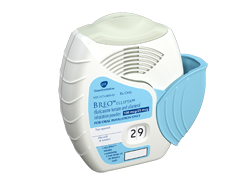 GlaxoSmithKline ($GSK) needs its respiratory blockbuster hopefuls Breo and Anoro to fill in where aging giant Advair is dropping off. Thing is, their launches aren't going as well as expected--and some analysts are pointing fingers at GSK's new quota-free sales model as the reason why.
GlaxoSmithKline ($GSK) needs its respiratory blockbuster hopefuls Breo and Anoro to fill in where aging giant Advair is dropping off. Thing is, their launches aren't going as well as expected--and some analysts are pointing fingers at GSK's new quota-free sales model as the reason why.
Glaxo's lung-drug newcomers pulled in a combined £10 million in Q2--"really way under what analysts expected," Sphera Funds Management analyst Ori Hershkovitz told Bloomberg. And as Leerink Partners analyst Howard Liang wrote in a Friday note to clients, if prescription trends in the last 8 weeks continue through the remainder of Q3, Breo will fall about $5 million short of consensus forecasts for that period, too.
While Anoro's early record beats Breo's early launch, script numbers still paint a picture of a "weak" initial rollout, Liang wrote. If Anoro continues on its current trajectory, total revenue this quarter would come out to $7.6 million, compared with his own $20 million estimate. Breo, meanwhile, is on track for $17.4 million, compared with his $25 million projection.
Those are rough stats for drugs that started off with a near-impossible task: filling the shoes of Advair, a drug that hauled in $8 billion last year. With generic competition on the market in some countries, Advair has already started to suffer, as Glaxo's second-quarter sales decline painfully showed.
Why the struggles for the duo, both deemed potential $1 billion-plus sellers when they nabbed FDA approvals last year? As Bloomberg reports, some analysts privately speculate that the drugs' slow start has something to do with the warm-and-fuzzy sales model CEO Andrew Witty has been implementing over the past few years.
 Under the new system, the company's field force shifted its focus and its compensation practices away from individual sales quotas and toward doctor-rep interactions. The idea was to encourage reps to emphasize the quality of the meeting and the informational exchange.
Under the new system, the company's field force shifted its focus and its compensation practices away from individual sales quotas and toward doctor-rep interactions. The idea was to encourage reps to emphasize the quality of the meeting and the informational exchange.
Critics have said that, without individual quotas, reps could lack the personal motivation to give their drugs the extra boost necessary in a crowded respiratory landscape. But Glaxo has stood by the new system. The drugmaker has gone as far as to say that its new sales targets could even provide a competitive advantage.
"Historically, in this industry we always had the notion, when you launch a product, you really have to give a big carrot to a sales organization so that they can really drive performance of a product," GSK's president for North America, Deirdre Connelly, told Bloomberg in March. "We do give a big carrot, but it's not in the way of individual sales targets."
CEO Andrew Witty, too, has defended the reforms. Announcing second-quarter results last week, he pointed to the company's rollout of Tivicay, a new HIV drug that has so far exceeded launch expectations.
So if it's not the model, what's going on with the newest additions to Glaxo's respiratory lineup? As Barron's suggests, lowered prices and reimbursement may be to blame. Morgan Stanley analyst David Friedman estimates that Breo was discounted by 41% in the second quarter. And that hasn't helped its case with certain payers like Express Scripts ($ESRX), which excluded both it and Advair from its national formulary this year.
Right now, Barron's says just 50% of patients covered by commercial insurance plans can get reimbursement for Breo, while Medicare plans cover 70% of eligible patients. Anoro has been slow to win coverage as well, with just 30% of Medicare Part D patients eligible for reimbursement.
Whatever the reason for the meds' slow starts, not to worry, CFO Simon Dingemans told investors last week. "We've always expected that it would take time and investment to build them to their full potential," he said.
- get more from Bloomberg
- see the Barron's piece
Special Report: The 10 best-selling drugs of 2013 - Advair/Seretide